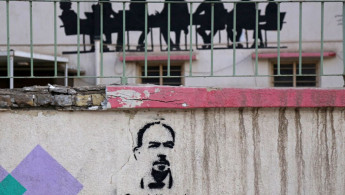Mother of slain Iraqi activist demands justice at sit-down protest
The mother of slain Iraqi activist Ihab Al-Wazni began a sit-down protest in front of a Karbala court on Sunday, demanding justice.
Nobody has been charged with the killing of Al-Wazni, who was shot dead outside his home on 9 May. Popular Mobilisation Forces (PMF) commander Qasem Muslih was arrested in connection with the assassination, but was released two weeks later.
The elderly woman returned for a second day of protest on Monday morning, sheltering from the hot summer sun in a tent she had brought from her home. The mother, who is not named, said she wanted to know who killed her son.
Footage circulating on social media showed Al-Wazni’s mother knocking on the window of a UN-marked vehicle, which drove off with no response – sparking outrage on Twitter.
This is disgraceful. Video shows the mother of assassinated activist Ihab al-Wazni trying to talk to a @UNIraq convoy in Karbala where she held an open sit-in demanding justice. The convoy didn’t even bother to roll down the window to exchange few words. @antonioguterres pic.twitter.com/mETHemhEA7
— Hoshang Waziri هوشنك وزيري (@HoWaziri) June 21, 2021
Protesters took to the streets of several Iraqi cities on Saturday to mark 40 days since Al-Wazni's assassination.
Al-Wazni's mother has been vocal in her search for her son's killer, appearing on a number of Iraqi television channels where she held Muslih responsible for her son's death.
Muslih is also suspected to have ordered the murder of activist Fahim Al-Taie, in 2019.
In a video shared on Telegram on Monday, the mother called on all Iraqis who have lost their protester loved ones to assemble outside courts and seek justice.
More than 600 people have been killed since the popular protest movement began in October 2019. Protesters across Iraq have called for the provision of jobs and basic services, and an end to corruption and mismanagement.
Militias and the Iraqi security forces are responsible for most of the deaths, but few have been charged with the killings.





 Follow the Middle East's top stories in English at The New Arab on Google News
Follow the Middle East's top stories in English at The New Arab on Google News

![22 Arab countries at COP29 have rejected the targeting of fossil fuels [Getty]](/sites/default/files/styles/image_330x185/public/2024-11/GettyImages-2184289638.jpg?h=199d8c1f&itok=ptHl5bec)
![Dozens of people turned out for the funerals [Getty]](/sites/default/files/styles/image_330x185/public/2024-11/GettyImages-2185229760.jpg?h=e7c891e8&itok=1bctDcE6)